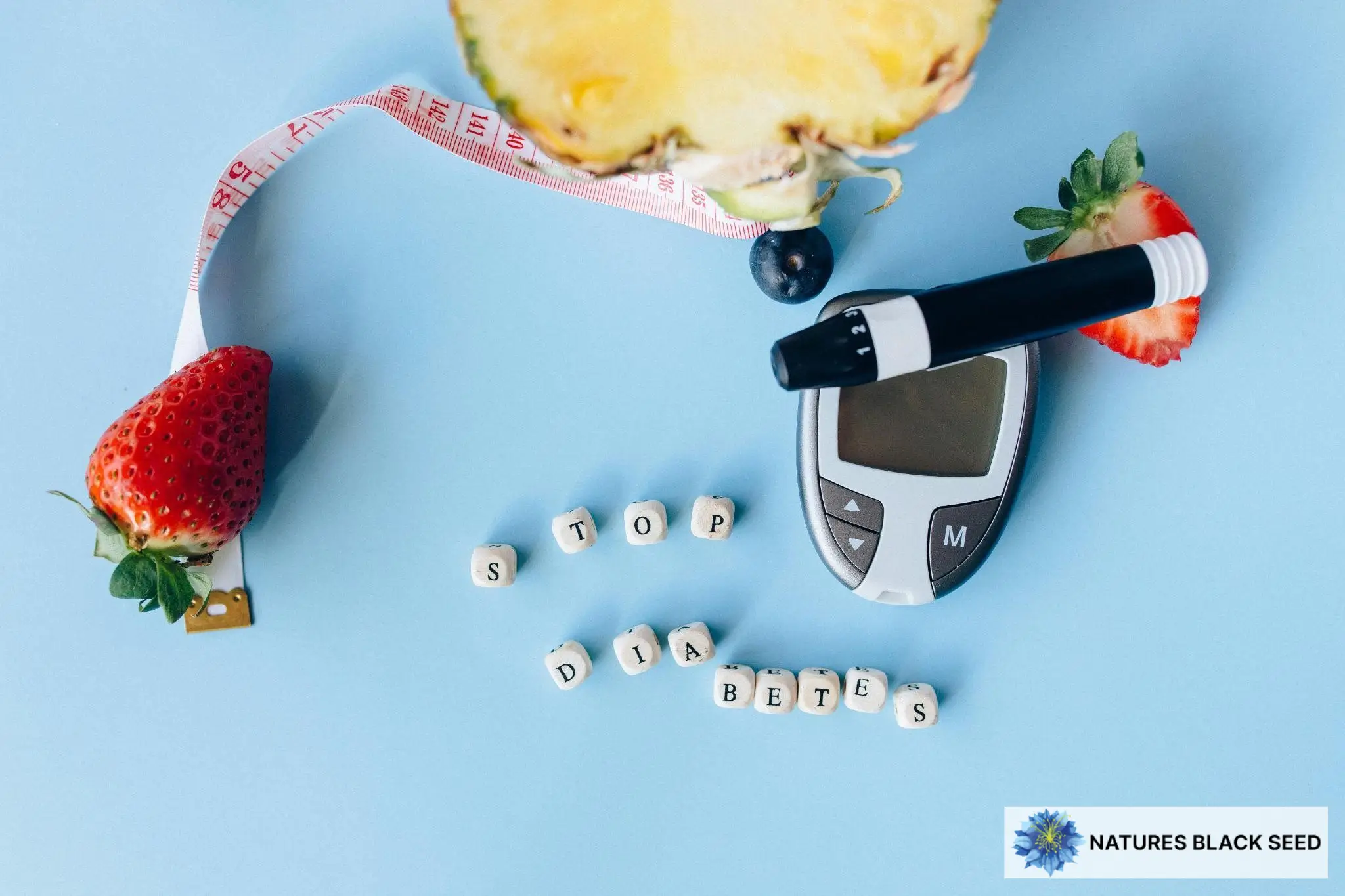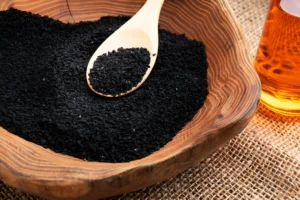
Black Seed Oil Good for Diabetics – A Deep Dive into Its Health Advantages
Black seed oil has been used since ancient Egypt and beyond, making it a mainstay of traditional medicine for ages. Particularly with relation to diabetes, contemporary research is starting to understand the processes behind its health advantages.
Regulating Blood Sugar Levels
One of the most significant benefits of black seed oil for diabetes is its ability to help regulate blood sugar levels. Diabetes is characterized by chronic hyperglycemia (high blood sugar levels), which, if left unmanaged, can lead to severe complications such as cardiovascular disease, neuropathy, and kidney failure. Elevated blood sugar levels can also contribute to gum disease, making effective diabetes management crucial not only for preventing severe systemic issues but also for safeguarding oral health and preventing complications such as inflammation and infection in the gums.
Research has shown that black seed oil for type 2 diabetes can enhance insulin sensitivity, which is crucial for the effective management of type 2 diabetes. The hormone called insulin is in charge of transferring circulatory glucose into cells so that it may be utilized as an energy source. In type 2 diabetes, the body becomes resistant to insulin, leading to elevated blood glucose levels. Black seed oil helps counteract this resistance, allowing insulin to work more effectively. For type 1 diabetes patients, where the body does not produce insulin, black seed oil for type 1 diabetes may still offer significant benefits by modulating the immune response and reducing inflammation, potentially preserving the remaining insulin-producing cells in the pancreas. This highlights that black seed oil is not only effective for type 1 and type 2 diabetes but also widely regarded as black seed good for diabetes management overall.
Guarding Against Complications Associated with Diabetes
Black seed oil helps diabetes by protecting against the long-term consequences of the disease, which unlocks further advantages. Here, black seed oil’s anti-inflammatory and antioxidant qualities are crucial. Diabetes frequently results in oxidative stress, a disorder marked by an excess of free radicals in the body. These free radicals cause cellular damage that can result in nephropathy, retinopathy, and diabetic neuropathy, among other problems. Thymoquinone, one of the powerful antioxidants found in black seed oil, scavenges these free radicals, lowering oxidative stress and safeguarding important organs. Black seed oil’s anti-inflammatory qualities also reduce the incidence of cardiovascular disease, a typical consequence among diabetics. Heart attacks and strokes can be caused by chronic inflammation, which is a major factor in atherosclerosis, or the accumulation of plaque in the arteries. The inclusion of kalonji benefits for diabetes further underscores the importance of this natural remedy in maintaining healthy blood vessels and overall cardiovascular health.
Boosting the Immune System
Black seed oil has an underappreciated advantage of boosting immunological function, which is crucial for those with diabetes. People with diabetes may have weakened immune systems, which increases their susceptibility to infections. The nigella sativa benefits for diabetes include its immune-modulating properties that can help strengthen the body’s defenses, reducing the frequency and severity of infections. Studies have demonstrated the antibacterial qualities of black seed oil, which may help prevent and cure infections including foot ulcers and urinary tract infections that are frequent in diabetics.
Improving Digestive Health
Good digestive health is essential for overall well-being and can have a positive impact on blood sugar control. Black seed oil has been traditionally used to treat various digestive issues, including bloating, indigestion, gastric ulcers, and acid reflux. For diabetic patients, maintaining a healthy digestive system can help with better nutrient absorption and more stable blood sugar levels.

Black seed oil’s bioactive components and their functions in managing diabetes
The abundance of bioactive chemicals found in black seed oil is thought to be responsible for its medicinal benefits. Together, these substances provide a number of health advantages, especially in the treatment of diabetes. Studies pertaining to Nigella sativa and diabetes highlight the significance of these substances. The black cumin seed oil benefits for diabetes are especially noteworthy, as these bioactive compounds play a critical role in diabetes management. The main bioactive ingredients in black seed oil are listed in the table below, along with their unique functions in the treatment of diabetes.
| Bioactive Compound | Concentration | Role in Diabetes Management |
| Thymoquinone (TQ) | 30-48% | Protects pancreatic β-cells, lowers oxidative stress, and increases insulin sensitivity. |
| Nigellone | 0.5-1.5% | Contains antioxidant and anti-inflammatory qualities as well as lowering blood sugar levels. |
| Alpha-hederin | Trace amounts | Boosts immunity and provides defence against consequences from diabetes. |
| Sterols | 10-15% | Enhances insulin action, lowers cholesterol, and promotes cardiovascular health. |
| Flavonoids | 1-2% | Reduce oxidative stress linked to diabetes and enhance antioxidant activity. |
| Alkaloids | 2-4% | Promotes blood sugar management, enhances insulin sensitivity, and has hypoglycemic effects. |
Thymoquinone (TQ)
It comprises 30–48% of the content of black seed oil and is the most researched and prevalent bioactive compound. It is principally in charge of the oil’s anti-inflammatory and antioxidant qualities. Research has demonstrated that TQ can improve insulin sensitivity, lower oxidative stress, and shield pancreatic β-cells from harm, all critical functions for the management of type 1 and type 2 diabetes.
Nigellone
Black seed oil also contains nigellone, a strong chemical, but at lesser concentrations (0.5–1.5%). It provides anti-inflammatory and antioxidant benefits in concert with thymoquinone, lowering blood sugar levels and preventing problems from diabetes.
Sterols
Fatty acids, such as β-sitosterol, comprise 10–15% of black seed oil. By lowering cholesterol, these substances promote cardiovascular health, which is especially advantageous for diabetics who are more susceptible to cardiovascular disease. Sterols also enhance the action of insulin, which helps to better manage blood sugar.
Scientific Validation of Black Seed Oil’s Benefits for Diabetes
Numerous studies have substantiated the potential benefits of kalonji oil for diabetes, showcasing its significant effects on glucose metabolism and insulin sensitivity. A study published in the Journal of Endocrinology and Metabolism found that black seed oil improved glucose tolerance as efficiently as metformin, a common anti-diabetic drug, but without the adverse side effects. In parallel, findings from the Journal of Ethnopharmacology highlighted that thymoquinone, a key compound in black seed oil, significantly reduced fasting blood glucose levels and enhanced insulin sensitivity in diabetic patients.
Further, a study in Phytotherapy Research demonstrated that black seed oil reduced HbA1c levels and improved lipid profiles in individuals with type 2 diabetes. Collectively, these studies provide a scientific foundation for understanding the black seed oil effects on diabetes, confirming its role as a beneficial supplement for those seeking natural alternatives to conventional diabetes treatments.
Understanding Black Seed Oil Dosage for Diabetes to Achieve Optimal Control
To effectively manage diabetes with black seed oil, it’s vital to grasp the correct dosage, as it plays a key role in maximizing benefits while minimizing potential side effects. The impact of black seed oil on diabetes is highly dependent on the dosage, making it important to follow the recommended guidelines closely.

Recommended Doses in General for Black Seed Oil
A daily dose of 1-2 teaspoons (about 2.5 mL to 5 mL) of black seed oil is advised for use in the overall control of diabetes. You may eat this straight up or dilute it with juice, yogurt, or honey to make it more pleasant.
- Black cumin seed oil dosage for diabetes: It is best to start with a smaller dose of black seed oil and increase it gradually. This lessens the possibility of adverse effects like upset stomach by allowing the body to adapt.
- Black seed oil capsules for diabetes: 500 mg to 1000 mg daily is a typical dose for people who prefer capsules. For some who might not like the flavor of black seed oil, capsules provide a handy method to get it.
Using Black Seed Powder for diabetes
Another kind of black seed powder that can be used to effectively treat diabetes is about 1-3 grammes per day. It may be poured over meals, blended with water, or used to smoothies. Studies have shown that the combination of black seed powder with other natural supplements, such as fenugreek or cinnamon, which have both been demonstrated to enhance blood sugar regulation, may be particularly advantageous.
Integrating Black Seed into Daily Meals
Including black seed in your diet on a regular basis might be a great approach to guarantee everyday consumption. You may add whole kalonji seeds for diabetes to baked products, salads, and curries. Not only can these seeds improve food flavor, but they also offer a consistent supply of the health-promoting components included in black seed.
- Kalonji and methi for diabetes: In Ayurvedic practice, the combination of kalonji (black seed) and methi (fenugreek) has long been used as a natural remedy for diabetes. These seeds can be consumed together in various forms, such as powders, teas, or as additions to meals. Their complementary effects on blood sugar regulation are well-documented, and they may also contribute to improved digestive health, offering relief from common issues like acid reflux thus enhancing overall well-being.
Ensuring Safe Use of Black Seed Oil in Diabetes Care
Most individuals can safely use black seed oil, but it’s vital to be aware of any possible interactions and adverse effects, especially if you’re treating a chronic illness like diabetes.
Typical Side Effects
Black seed oil most frequently causes digestive problems including bloating, constipation, or nausea. They are usually not very severe and can be lessened by gradually increasing the dose from the beginning.
- Black seed oil side effects diabetes: The main worry for people with diabetes is the possibility of hypoglycemia, particularly when using black seed oil together with other drugs that reduce blood sugar. When adding black seed oil to your regimen, it’s important to regularly check your blood sugar levels to prevent dangerously low levels.
Interactions with Medications
Before incorporating black seed oil into your regimen if you are presently on diabetic medication, such as insulin or oral hypoglycemics, speak with your healthcare provider. The oil could intensify the effects of these drugs, increasing the chance of hypoglycemia.
- Recommended doses nigella sativa for diabetes: Your doctor may change the suggested dose of black seed oil based on your specific health issues and the drugs you take to make sure it works in harmony with your current treatment plan rather than against it.
Key Takeaways
Black seed oil stands out as a valuable natural remedy for managing diabetes, offering a range of benefits from improved blood sugar control to protection against diabetes-related complications. With its potential to enhance insulin sensitivity and reduce inflammation, kalonji for diabetes provides a holistic approach to diabetes management. Adhering to recommended dosage guidelines and being aware of potential side effects are crucial for integrating black seed benefits for diabetes into your regimen effectively. For those seeking a natural supplement to complement their diabetes treatment, black seed (Nigella sativa) offers significant therapeutic advantages. Always consult with a healthcare professional before making any changes to your treatment plan to ensure that black seed oil is used safely and effectively, thus maximizing its benefits in managing diabetes.









